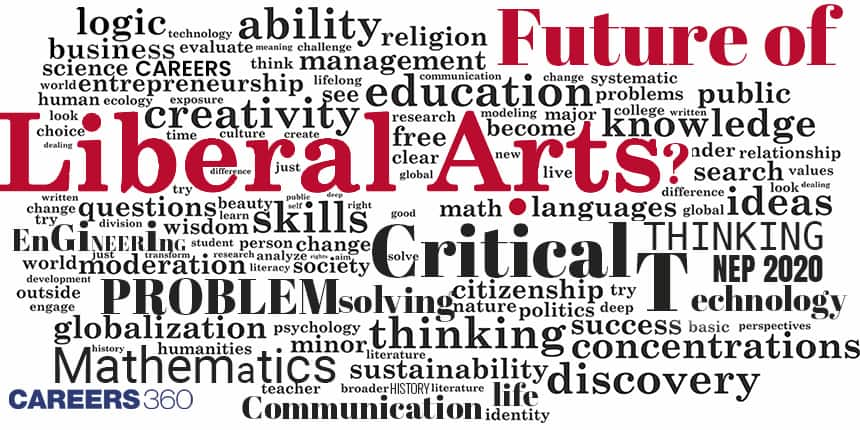Future of Liberal Arts: Scope, Challenges, and Opportunities
Liberal arts provide a cross-disciplinary education methodology combining two or more disciplines in a single degree. It combines STEM (Science, Technology, Engineering, and Mathematics) with arts and humanities subjects to develop students' thinking and understanding. The low enrolment in humanities courses because of fewer career prospects has resulted in many providers coming with liberal arts degrees.

Very limited colleges in India offer liberal arts degrees but the trend is expected to change with the implementation of the National Education Policy of India (NEP) 2020. A large focus of NEP is to equip students with soft skills like communication, problem-solving, and critical thinking in addition to technical training.
With the current job market, we can sense the need for professionals with both soft and hard skills. We are in an era where technology is changing at a very fast pace and it has become important to have professionals who can take up any challenge in the future.
Also Read: Liberal Education as per NEP 2020
Challenges in Liberal Arts Education
There is indeed a need for liberal arts education to develop a student’s overall personality so that they can overcome any professional and personal challenges. But, there are various problems that authorities can face during its implementation.
Course Recognition: There is a valid concern that a liberal arts education might not be as directly recognised in the job market as a specialised degree. For example, a computer science major student might appear to have an advantage over someone with a liberal arts degree that includes computer science alongside history and philosophy.
Flexibility: Another challenge is the right combination of subjects. There are many subjects of humanities and social sciences, and merging them with STEM can be challenging. However, this can be overcome by giving students the flexibility to choose combinations of subjects, as per their interests.
Adaptability to Change: The technology around us is changing very fast and so are industry trends. So, while providing liberal arts education, it is also important to update the course content regularly to meet the industrial need.
Eligibility for Government Jobs: Degrees also open gates for many government jobs. But, as of now, liberal arts degrees are not considered for many government jobs. So, authorities should also make sure that liberal arts degrees are also provided with equal importance in the public sector.
Also Read: Top Liberal Arts Specialization in India
Future of Liberal Arts
The future of liberal arts education depends on the authorities and how the degree is offered. How quickly authorities adapt to industrial trends and incorporate those trends with other subjects is also important.
The liberal arts student brings a valuable skillset to the table. The strength of a liberal arts education lies in its development of transferable skills. Critical thinking, communication, problem-solving, and adaptability are highly sought after by employers across various industries. Management is the role that graduates can be best suited to because of the above-mentioned skillset.
Also Read: How Liberal Arts Can Help in Today's Job Market?
The liberal arts graduate can approach problems from different angles, think creatively, and effectively communicate solutions. This well-rounded skill set can make them a strong candidate, especially in fields that value these adaptable strengths.
In today's dynamic job market, employers often recognise the value of a liberal arts education alongside specialised training. A liberal arts education can equip graduates for long-term success and career flexibility. However, the opportunities are limited as of now, but it is expected to increase in the future.
Popular Courses and Specializations
Popular Branches
Popular Courses
- BTech Production Engineering: Course, Eligibility, Admission, Syllabus, Fees, Jobs, Scope
- B.Tech in Telecommunication Engineering: Course, Admission, Fees, Scope, Salary
- B.Tech in Power System Engineering: Courses, Fees, Jobs, Scope
- B.Tech in Silk Technology: Course, Eligibility, Fees, Scope, Salary
- BSc Nursing: Course Fees, Duration, Admission 2025, Eligibility, Syllabus, Career Options
List of B.Sc. colleges
Questions related to B.Sc.
On Question asked by student community
Bachelor of Science (B.Sc) in Computer Science is a full-time three-year undergraduate degree course at Allahabad University. Students who have passed class 12th with a science stream or equivalent from a recognised board will be eligible for admission in Allahabad University .
Which university are you specifically considering for a BSc Forensic Science degree? Knowing this will help me provide you with specific details about the programme.
AMU offers admissions for various UG courses through CUET 2026 . However, the university does not accept CUET UG 2026 scores for BSc Zoology.
Patna Institute of Nursing and Paramedical Science offers the 4-year Bachelor of Optometry (BOpt) programme (3 years+Internship). The eligibility criteria to apply for the programme is that students must have passed 10+2 with Biology. The total fees of BOpt at Patna Institute of Nursing and Paramedical Science is Rs 2,00,000
Applications for Admissions are open.
Among top 100 Universities Globally in the Times Higher Education (THE) Interdisciplinary Science Rankings 2026
Amity University-Noida M.Sc Admissions 2026
ApplyAmong top 100 Universities Globally in the Times Higher Education (THE) Interdisciplinary Science Rankings 2026
IIHS University Admissions 2026
ApplyMaster's programs in Sustainability Science and Practice; Climate Change Science and Practice; Urban Economic and Infrastructure Development; Human Development Policy and Practice
Karnavati University B.Sc Admissions 2026
Apply100% Placements Assistance | 1200+ Recruiters
SRM Medical College Admissions 2026
ApplyRanked #18 by NIRF, NAAC A++ Accredited | Unmatched clinical exposure with over 7 lakh patients yearly
Chandigarh University Admissions 2026
ApplyNAAC A+ Accredited | Among top 2% Universities Globally (QS World University Rankings 2026)
